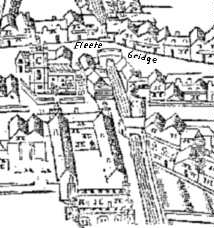The sewers of London
In the winter, middens made up of human and animal excrement steamed with the warmth of decay beloved of the alchemists* if no-one else. In the city, chamber pots might be emptied directly into the streets, which would only be cleaned in a heavy shower of rain.
The Fleet River (after which Fleet Street in London is named) was known as Fleet Ditch. It was in effect an open sewer, infested by rats--a certain source of infection for the plague.
Ben Jonson wrote a fine scatological, mock-heroic poem about an epic voyage made by two University students (Heyden and Shelton) in a rowboat along the length of the ditch: "On the famous voyage."*
Footnotes
-
Anything for science . . .
Many chemical processes that required steady low heat were performed by burying a glass jar in horse dung. Click for more on a famous alchemist.
-
On the famous voyage
No more let Greece her bolder fables tell
Of Hercules, or Theseus going to hell. . .
We have a Shelton, and a Heyden got,
Had power to act, what they fain had not. . .
Arses were heard to croak, in stead of frogs;
And for one Cerberus, the whole coast was dogs.
And, for the cries of Ghosts--women, and men,
Laden with plague-sores and their sins--were heard;
Lashed by their consciences, to die, affeard. . .[Cerebus was the two-headed dog guarding the exit from Hades.]
